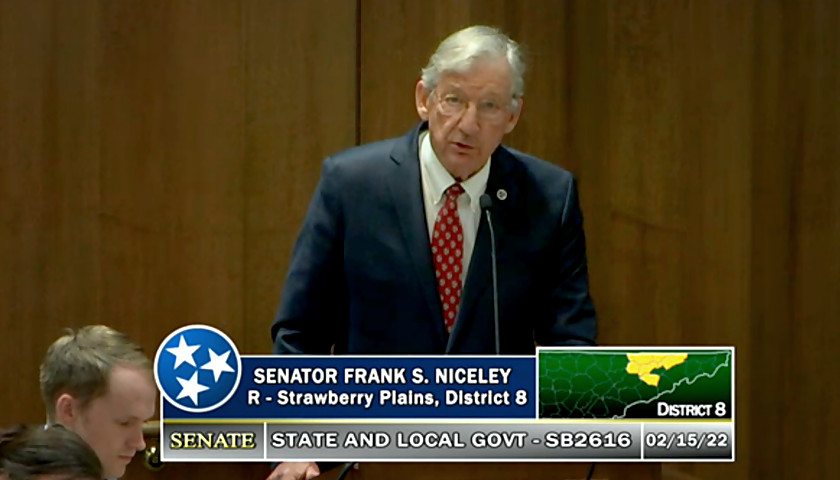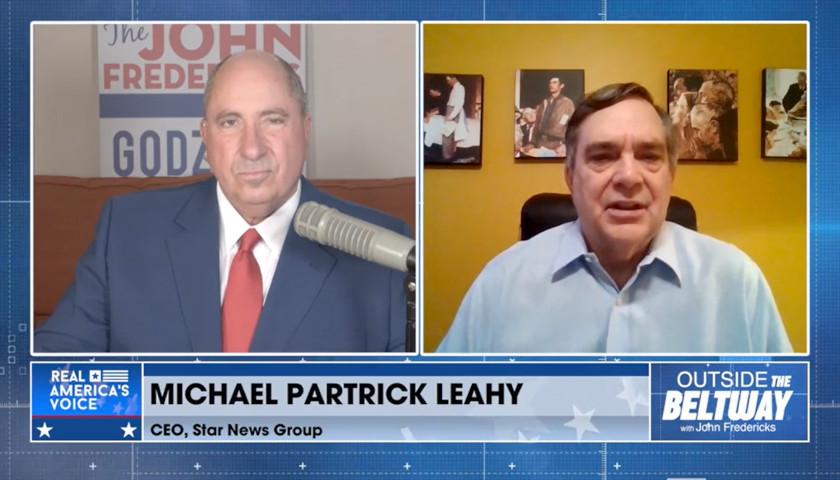Legislation establishing a three-year residency requirement to qualify for the Tennessee primary ballot in U.S. House of Representatives elections passed a key Senate committee on Tuesday.
Tennessee State Senator Frank Niceley (R-TN-08) is the sponsor of SB2616, which states that candidates for U.S. House and U.S. Senate must meet the same residency requirements as Tennessee state representatives and state senators in order to run in a primary in Tennessee. That means a candidate has to have lived in the state for three years.
SB2616 was recommended for passage by the Senate State and Local Government Committee.
Originally, the bill had language which would prohibit a person from being nominated as a candidate for U.S. Senate or U.S. House of Representatives unless they had voted in the three previous Tennessee elections, but the bill was amended prior to consideration of the final version.
SB2616 now heads to the Senate Calendar Committee, whose responsibility it is to schedule the bill for Senate floor consideration.

The committee vote was five in favor, one against, and one voted present/not voting. Senators Bill Powers (R-Clarksville-SD22), Ed Jackson (R-Jackson-SD27), Sara Kyle (D-Memphis-SD30), Jeff Yarbro (D-Nashville-SD21), and Page Walley (R-Bolivar-SD26) voted in favor. Senator Todd Gardenhire (R-Chattanooga-SD10) voted no. Ken Yager (R-Kingston-SD-12) voted present/not voting.
Senator Niceley presented the bill to the committee. He said, “The state constitution says requires that you be a resident of the state for seven years before you can run for governor. You have to be a resident for five years in order to run for judge or DA. You have to be a resident for three years to run for the state House or the state Senate. The state constitution and U.S. Constitution are silent on the residency for the Congress and U.S. Senate.”
He then quoted U.S. Supreme Court Associate Justice Antonin Scalia who said, “Nothing in the Constitution deprives the people of each State of the power to prescribe eligibility requirements for the candidates who seek to represent them in Congress. The Constitution is simply silent on this question. And where the Constitution is silent, it raises no bar to action by the States or the people.” Senator Niceley added that it is hard to argue with Justice Scalia.
Senator Niceley then read the amended bill text to the committee, “In order to qualify as a candidate in a primary election for United States senate or for member of the United States house of representatives, a person shall meet the
residency requirements for state senators and representatives contained in the Tennessee constitution. ”
Senator Yager asked committee attorney Josh Houston if he thinks this legislation will pass constitutional muster. Houston responded, “There have been attempts made in the past to add additional qualifications by states for members of Congress. They have all been declared unconstitutional.” Mr. Houston then referred to a 1995 case where the U.S. Supreme Court declared term limits for Congress to be unconstitutional. That case was a 5-4 decision. Justice Scalia wrote a dissent.
Senator Yarbro asked a question whether previous cases dealt with a partisan process, and Houston replied that previous cases applied across the board. He also said that this legislation could possibly raise freedom of association issues.
Senator Niceley spoke again and said there is precedent in the U.S. Constitution saying that the states could have residency requirements for electors. Those previous cases at SCOTUS were under a liberal court. Senator Niceley said he expects different outcomes than those cases with the current makeup of the Supreme Court. He reiterated that Justice Scalia had said that nothing in the U.S. Constitution deprives the people in each state the power to determine eligibility requirements for elections and that the U.S. Constitution is silent on this issue. The 10th Amendment gives the states the power. The Supreme Court today would rule in favor of this legislation.
Senate Minority Leader Yarbro said that he thinks it is a slightly different issue than the counsel raised because it is a primary.
Senator Niceley added that the word “primary” is not mentioned in the U.S. Constitution. If it isn’t mentioned then it is left to the states, per the 10th Amendment.
Senator Yager asked the counsel again if the word “primary” changes constitutionality. Mr. Houston said he wasn’t sure what the constitutional effect would be if it is just limited to primaries and he isn’t sure what the result would be in court. He conceded that this situation would be different than other cases, but he is unsure what that means.
Senator Yager says he respects Senator Niceley and has constitutional questions about the bill. If it is indeed unconstitutional then significant state resources would have to be spent defending it. Senator Yager said that he was not necessarily opposed to the legislation but wants the state to avoid going to court unnecessarily.
Senator Niceley said several times that he believes that the current SCOTUS will uphold this legislation and he also doesn’t know how anyone could argue with Scalia.
Senator Gardenshire said he’s not for this, and that the parties should set the standards, since we are talking about a primary election. In his view, he wants it up to each party to decide who they nominate.
After discussion was exhausted, the committee voted to pass the legislation and referred it to the Senate Calendar Committee.
After the vote, Senator Niceley said that when he and Senator Yarbro agree on something, you must pay attention.
If this legislation passes and is enacted into law, it will significantly shake up the TN-5 GOP primary field, as it renders music video director Robby Starbuck and former Trump administration State Department spokesman Morgan Ortagus ineligible to run in the primary.
Read the amendment:
[wonderplugin_pdf src=”https://tennesseestar.com/wp-content/uploads/2022/02/SB-2616-Amendment-1.pdf” width=”650px” height=”800px” style=”border:0;”]
– – –
Aaron Gulbransen is a reporter at The Tennessee Star and The Star News Network. Email tips to [email protected].









[…] media outlets, including local press in Tennessee and national papers such as the New York Times, have reported the bill would make […]
[…] bill passed in the State and Local Government Committee of The Tennessee State Senate on Tuesday in a […]
If they want to pass this bill, it should not go into effect immediately.
I don’t understand why “Republicans” would shoot themselves in the foot. Jim Cooper ran unopposed in 2020 and I’m pretty sure he was unopposed in 2018. We finally have Republicans interested in Representing Nashville, and their fellow party members are very quickly trying to keep them out!
You have a bad case of selective sensitivity M. Flatt. Residency requirements to run for office have long been in the Tennessee Constitution and they are not particularly controversial insofar as they are intended to make sure that some unknown individual with little connection to this state but with barrels of money from descending on us and buying an elective office. Thus the Constitution requires that you have to live in Tennessee 7 years before you can run for governor, 5 years for judge or DA, and 3 years for either house of the General assembly. The candidacy of Madam No simply brought it to most people’s attention that we need such a provision regarding members of the U. S. Congress that mirror those for the state’s General Assembly.
Everyone’s welcome to be a Republican as soon as they move here. The requirement to run for office should reasonably be a bit tougher.
Okay, that’s a good bill. Now, start passing bills to STOP THE GREAT RESET! Our future is grim if we do not stop the fascists who are occupying our federal government.
Good legislation. As New York, Washington,, and Southern California become more and more uninhabitable we are faced with an influx of well-connected showbiz and swamp narcissists who relocate to the Nashville area. These types are well-connected to money, and often are physically attractive while having a public presence but substantively they are an unknown quantity with no connection to the community they seek to represent. Morgan Ortagus (“Madam ‘No'”) is an extreme example of this type of specimen and I can’t help but believe that her preposterous candidacy, that nevertheless must be taken seriously, was the final straw that inspired SB2616. By all means pass this legislation so Madam No (No connection to the community, No connection to any faction of the Republican Party, No record in elective office, No deeply held ideological beliefs) can finally finish unpacking and relax.
Absolutely right. Just as Trump endorsed Vernon Jones in GA, doesn’t make it all OKI DOKI. That’s how Fulton County (Atlanta) got so screwed up. Hollywood moved to GA (some of it anyway). In Rutherford County, we’ve seen outsiders move in and get on the election bandwagon without being 100% qualified. Only because citizens stayed on their butt did they finally give it up and drop out. Same now happening again in District 5. The elites in the district turn their heads and look the other way for someone that doesn’t meet the rules. I guess Starbuck is “now” qualified ? I hear TN us one of 16 states that will still use the Dominion machines and, if so, that should help the crooks elect who “they” want versus what “we the people” want.
Amazing how quickly a bills moves through the General Assembly when politicians want something done as quickly as going through the drive-thru. It just so happens the citizens will also benefit….this time.
How useless is a Senator that votes present not voting on any issue. They should be required to vote yes or no. This is a good legislation that protects the citizens.